by Mary Ratcliff
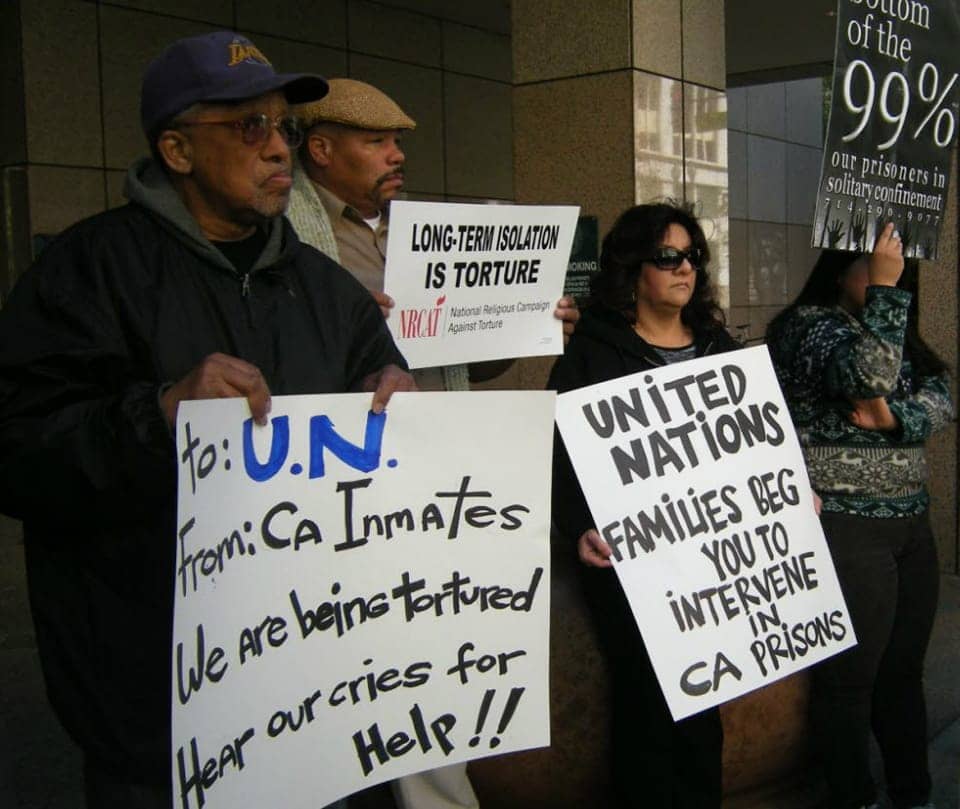
“California holds more prisoners in solitary confinement than any other state in the United States or any other nation on earth. The treatment of these prisoners is barbaric and, numerous experts agree, amounts to torture.” Peter Schey, who heads the Center for Human Rights and Constitutional Law, is lead counsel for the prisoners who have “joined together to petition the United Nations to intervene by conducting on-site investigations, permitting Red Cross visits, and ultimately ruling that California’s policy on isolated segregation amounts to torture and violates well-established international human rights norms.”
The petition, released at a press conference in Los Angeles Tuesday, calls for U.N. action against California’s prison administration and deplores the conditions of thousands of California prisoners Schey says are “being detained in isolated segregated units for indefinite periods or determinate periods of many years solely because they have been identified as members of gangs or found to have associated with a gang.” “The policy that has resulted in their prolonged detention does not require that they have actually engaged in any misconduct or illegal activity, or that they even planned to” do so, explains the petition.
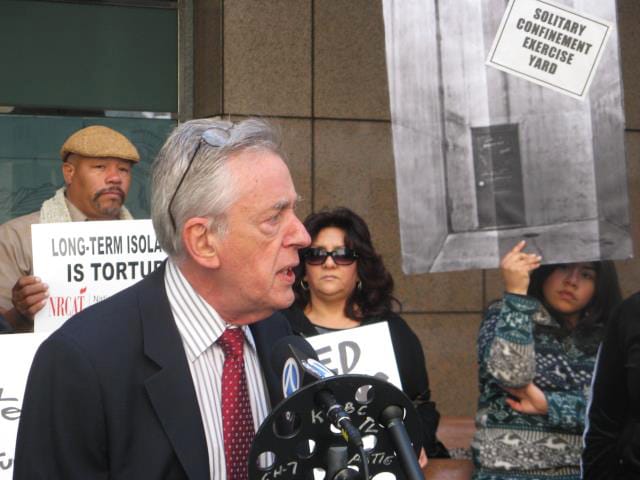
“Conditions inside California’s SHUs and ASUs were at the center of two massive waves of hunger strikes last summer and fall that saw the participation of thousands of prisoners in at least a third of California’s 33 prisons. A key demand of the strikes was the abolition of the California prison system’s draconian gang validation and debriefing processes, behind which a vast majority of prisoners in SHUs and ASUs have been held in solitary confinement,” says Isaac Ontiveros, spokesman for Prisoner Hunger Strike Solidarity.
“I am being persecuted for exercising my First Amendment rights to protest the inhumane treatment and torture being applied directly against myself and similar situated prisoners held in CDCR (California Department of Corrections and Rehabilitation) torture chambers – SHU and AdSeg solitary confinement units. What my fellow CDCR prisoners don’t know is that CDCR has malicious intent to destroy the minds, souls and spirits of 4,000-plus prisoners by any means necessary,” writes Mutope Duguma, s/n James Darren Crawford, a frequent contributor to the Bay View and a leading hunger strike organizer housed in the SHU at the notorious Pelican Bay State Prison.

“I have been housed in the SHU since July 1987. I have seen fellow prisoners murdered by correctional officers, mentally ill prisoners abused, I have seen men psychologically break down, cry, scream and go insane. I have been beaten by correctional officers, threatened and set up. I was told by a correctional officer at Pelican Bay State Prison that I would die here one way or another, and every day I meditate to keep control. The SHU is a soul sucking, mind-bending torture that murders all humanity in any human being. Some die quicker than others … but we all die inside,” writes Alfred Sandoval, also a leading hunger strike organizer at Pelican Bay.
“As a result of the policies and practices that leave California with the largest population of prisoners in isolated segregation anywhere in the world, these prisoners suffer extreme mental and physical harm, including mental breakdowns, extreme depression, suicidal ideation, and breaks with reality, such that their treatment may be considered torture or degrading treatment illegal under well-established international norms and obligations of the United States and the state of California under, inter alia, the United Nations Convention Against Torture and Other Cruel, Inhumane or Degrading Treatment or Punishment (CAT) and the International Covenant on Civil and Political Rights (ICCPR),” the petition states.
Alma Espinosa, whose brother in confined in the Corcoran State Prison ASU, was one of the prisoners’ family members and supporters who spoke to reporters at the Tuesday morning press conference: “I got involved when my brother asked me to help him and the others. In essence, the SHU, ASU, it’s a horrible, dehumanizing place. Four walls become your world, sunlight is rare, healthcare is rare, visits are only through glass, and inmates spend years and years in solitary confinement.”
“In essence, the SHU, ASU, it’s a horrible, dehumanizing place. Four walls become your world, sunlight is rare, healthcare is rare, visits are only through glass, and inmates spend years and years in solitary confinement.”
Espinosa’s brother was in a neighboring cell to that of Christian Gomez, the first know martyr of the 2011 series of hunger strikes aimed ultimately at ending the torture of solitary confinement. At one point last fall, 12,000 prisoners were simultaneously on hunger strike, many losing 30-40 pounds. Defying his duty to safeguard prisoners’ health, a captain at Calipatria, a prison in the Mojave Desert where the temperature in the cells often reaches 120 degrees, cut off all water to the hunger striking prisoners.
“Inmates are human beings!” Espinosa cried out. “They made mistakes, but this punishment is beyond acceptable. Please, United Nations, help us tell the state of California and the United States that this is unacceptable, a violation of human rights.” The petition names as responding parties the United States of America, the State of California, California Gov. Jerry Brown and California Corrections and Rehabilitation Secretary Matthew Cate.
For the love of my husband: How the historic U.N. petition was born
Organizing and emceeing the press conference was the culmination of eight months of work with Peter Schey and the Center for Human Rights by Kendra Castaneda. Her husband is one of the lead petitioners. “Not only have I been assisting Peter Schey, but my husband is being tortured in segregation by the California Department of Corrections and Rehabilitation. He was validated as a prison gang associate with fabricated ‘evidence.’ He has done nothing to harm another, yet our little girl and I have been denied visits with him for a year.
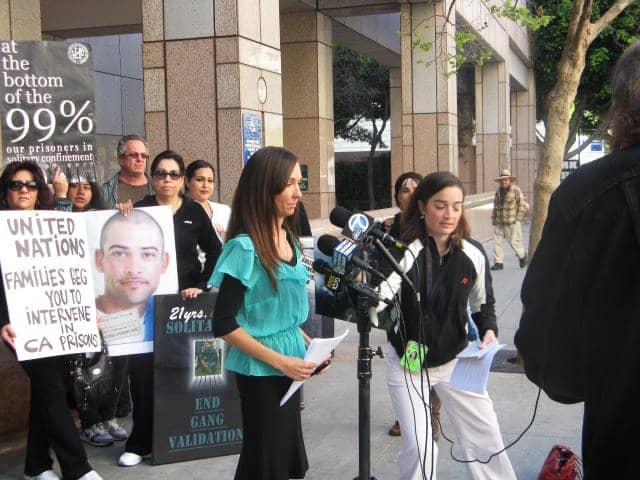
“During the July 2011 hunger strike led by prisoners in the Pelican Bay SHU,” says Castaneda, describing the genesis of the U.N. petition, “I contacted many reporters and law offices to show I had legal documentation that CDCR was lying by labeling segregated prisoners the ‘worst of the worst’ with their prison gang validation. I needed someone to hear me and help my husband and all the other men inside suffering.
“I had sent my husband’s legal documentation to a reporter who had written a good piece on the hunger strike. Without my knowledge, this reporter saw what I was talking about and forwarded my documents to Peter Schey, president and executive director of the Center for Human Rights and Constitutional Law. Peter Schey called me and heard me out about the many men throughout the state in solitary confinement that CDCR was trying to hide.
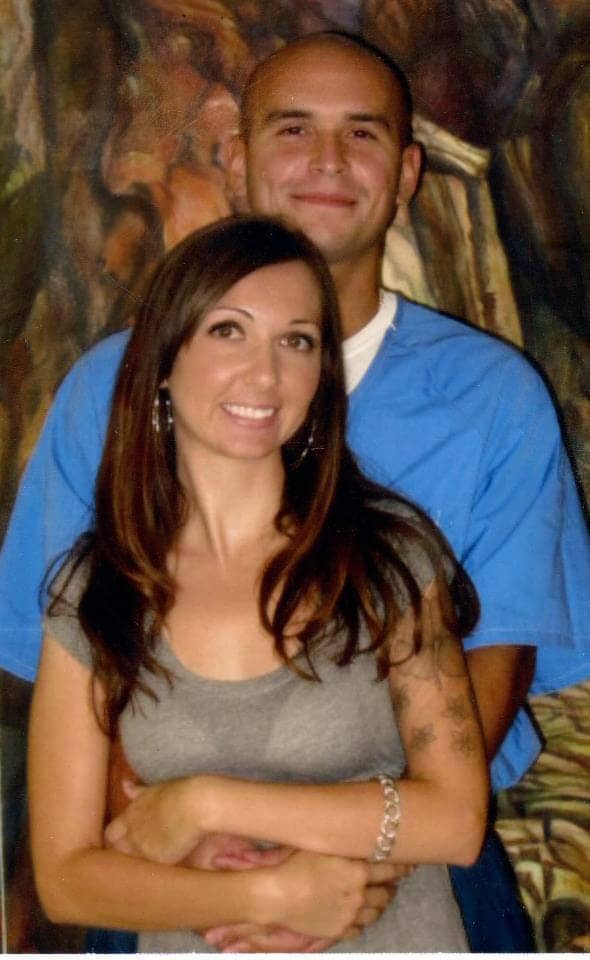
“Peter thought of taking only those inmates with a known family member contact, making it easier to stay in touch with them. I explained that the majority of these men do not have families anymore, and I told him if I needed to be the one to write them, then I would in order for them to be able to participate in this petition he was thinking of. That’s how it all started.
“Many families started writing their loved ones at all different California prisons to get on board. As I began writing to hundreds of men throughout the state, my heart grew. Out of compassion especially for those who had no one, I befriended them with a card or short letter to let them know they were not forgotten.
“I tried to reply to every letter, as my responsibilities at the office grew and I tried to keep up. I input data, helped Peter Schey contact organizations to join the petition, and stayed in close contact with prisoners’ families. Most important to me was keeping in touch with the men inside. It’s one thing to send them a questionnaire to fill out with their untold stories of abuse and mental and medical issues, but it’s another thing to explain to each one why he as a person is important, explaining this was his decision to open up and if he didn’t want to, then he would still be included.
“I showed the men they could trust me with information they had never told anyone, not wanting to appear weak. Many opened up, sharing their deepest thoughts and the horrors of abuse. I had to read their statements one by one as I entered them into the database.
“It was not easy. Reading what my husband was going through was hard enough, but after reading over 400 testimonies, I felt as if I had stepped in their shoes. I heard their cries for help, and when we needed their legal documents, I told them that if they sent their only copy, we would copy and return it. It was a process, but we did that. The prisoners saw they could trust us, and hundreds of legal documents rolled in.
“The process of choosing the 22 lead petitioners was not easy. It was based on whoever fully filled out our questionnaire asking about their mental and physical health, legal actions, food quantities and so forth. Deciding we wanted a range of durations in segregation, we chose prisoners who had been held from one year all the way up to 39 years.

“I was honored that Peter Schey trusted me to speak with other attorneys and organizations on his behalf and to set up the press conference, assigning me as the media contact person. Peter respects me and all the family members as prisoner human rights advocates. He invited the families to make comments and suggestions on the draft questionnaire and involved them in the process of developing and drafting the U.N. petition draft. I must note that without the families’ involvement, the petition may have never taken off – they have been such a big help in all of this.”
Jean Casella and James Ridgeway of Solitary Watch observe, “The petition itself is a notable document for anyone concerned with solitary confinement in the United States. It runs to 63 pages and includes case studies of each of the named plaintiffs, along with extensive discussion and documentation of how their confinement violates both U.S. and international law.”
The petitioners accuse California’s prisons of subjecting inmates to “cruel, degrading and extreme punishment prohibited by international human rights norms and obligations of the United States of America, including the State of California.” It describes their conditions as follows:
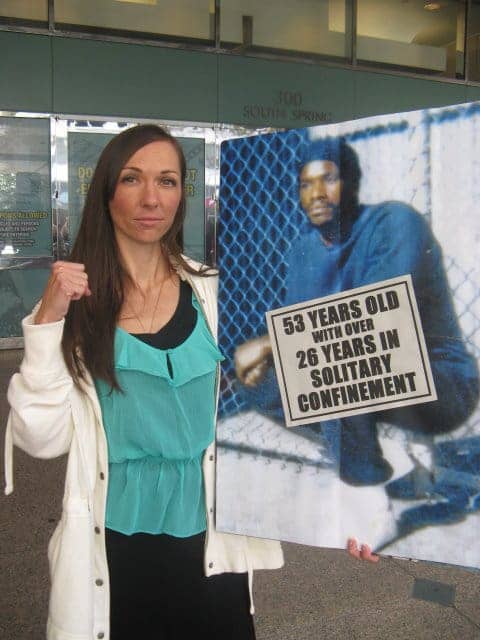
The U.N. Committee against Torture established under the Convention against Torture has recommended that the practice of placing prisoners in isolation be abolished altogether. Ending each round of last year’s hunger strike, the California Department of Corrections and Rehabilitation promised to make substantial changes to its gang validation and debriefing criteria.
But initial responses from hunger strike leaders to a new gang management strategy proposed by CDCR on March 1 and made public March 9 soundly reject it as a ploy to place far more prisoners in segregation. They see the strategy as a means to offset the layoffs and budget reductions expected to follow a federal court order to reduce prison overcrowding, saying that housing prisoners in segregation costs about twice as much as housing them in “general population.”
The organizers of last year’s hunger strike are seriously considering a resumption of the strike this summer. Advocates hope that the U.N. petition will stimulate a strong enough public outcry to prompt CDCR to meet the hunger strikers’ demands. A day after its release, the petition has already generated 73 stories in major newspapers.
Statements of the 22 lead petitioners
1. “I’ve been in prison for 16 years, most of which has been spent in segregation hell. Every single moment I’ve spent in these torture chambers has chipped away my humanity. Prison life is hard enough. When you segregate a man and treat him worse than you would treat an animal, you not only break his spirit but you slowly crush his soul.” – Walter J. Coto, J-88438. He spent the last three years in “temporary” segregation at Calipatria State Prison ASU until his recent transfer to the Corcoran State Prison SHU.
2. “I’ve been in the SHU for over 25 years – 21½ years in Pelican Bay State Prison SHU, wherein each minute has been torturous to my mind and body! I’m permanently disabled and suffer chronic pain to the point of sleep deprivation and harm to all daily activities. I’ve been eligible for a parole date since 2004. I’ve had no human contact with loved ones in over 25 years. I’m told if I wanted adequate medical care, a chance at parole, a hug by family, then I must become a known informant against others for the state – otherwise, I will be tortured here until insanity or death!” – Todd Ashker, C-58191, Pelican Bay State Prison SHU
3. “I have been in segregation for years and it feels like torture. Each day that goes by this isolation tries to break our spirit and humanity. I have not been put in segregation for disciplinary reasons. If you look into CDCR records for the last five to 10 years, it will prove that CDCR validates hundreds of inmates for no disciplinary reason. This shows hundreds of inmates are being tortured mentally and emotionally without cause.” – Christopher Flores, G-48073, California Correctional Institution SHU
4. “I have been housed in the SHU since July 1987. I have seen fellow prisoners murdered by correctional officers, mentally ill prisoners abused, I have seen men psychologically break down, cry, scream and go insane. I have been beaten by correctional officers, threatened and set up. I was told by a correctional officer at Pelican Bay State Prison that I would die here one way or another, and every day I meditate to keep control. The SHU is a soul sucking, mind-bending torture that murders all humanity in any human being. Some die quicker than others … but we all die inside.” – Alfred Sandoval, D-61000, Pelican Bay State Prison SHU
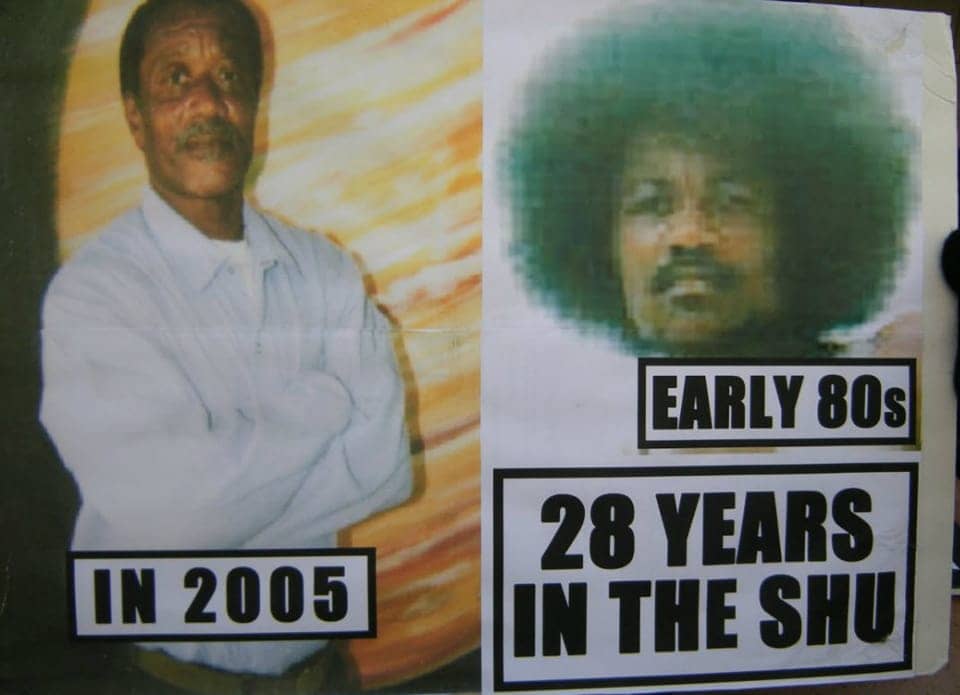
6. “For 16 years, I’ve been held in isolation solely because of who I am. Every moment of those 16 years, my captors and the dehumanizing conditions of the SHU have psychologically tormented me. I struggle every day to hold onto my sanity and humanity, for I am a man. I am a man being tortured, dehumanized and psychologically tormented, but a human being nonetheless, praying that the world finally hears the cries of the tormented souls trapped inside the SHU.” – Javier A. Zubiate, J-83189, Pelican Bay State Prison SHU
7. “I have been in the SHU for the past 11 years and counting solely based on my political ideology of New Afrikan revolutionary national scientific socialism. Though I did suffer slight bi-polar prior to SHU, only 40 days in isolation I began having auditory and visual hallucinations requiring medication and a greater level of psychological care. This torture without end has damaged my joints and legs to the degree that my normal function is diminished, and I no longer view any great distinction between death and my current existence. Struggle is my only hope, and I genuinely don’t care if I die in the process.” – Political Prisoner S. Heshima Denham, J-38283, Corcoran State Prison SHU
8. “I have been in ASU for three years now. With each passing year I see a change within myself. I no longer trust anyone and I have a distrust for all prison staff because I feel like they will assault me again. I feel hopeless and tired all the time. I am no longer an outgoing person anymore, I miss my family immensely, and I wonder how I will function normal again once I do parole?” – Scott D. Stoner, K-40009, Calipatria State Prison ASU
9. “I’ve spent the longest six years of my life here in segregation. This isolation has been a torturous experience and it’s growing worse as the time passes. It has broken my spirit, my soul, and it’s now even taking its toll on my mind. I just hope I won’t go insane before I go home.” – Victor Cantero, T-71200, California Correctional Institution SHU

11. “I have been in the SHU on and off from June 1995 until now because of a fake prison gang validation. Since being housed in the SHU, I’ve definitely experienced mental and physical abuse, torture and death threats at the hands of prison staff who are employed at this prison, especially in the SHU.” – Synrico J. Rodgers, T-21144, Corcoran State Prison SHU
12. “I am 63 years old and my chronic asthma has worsened while in segregation. I find myself fighting for oxygen in my SHU cell. I have been disciplinary free since November 1989 and should be released from the SHU. I am not dying from drowning, but kept on the verge of it relying on prison/medical staff for life-saving relief that comes ever so slow in the SHU. It affects me not only physically but also mentally … I am a life-term prisoner by the California courts, and CDCR has made me a life-term-SHU prisoner.” – Roberto Campa Lopez, C-22294, Pelican Bay State Prison SHU
13. “I have been in SHU isolation for 35 years. I would not treat my worst enemy in such a way as I have been placed in isolation this long. To torture another human being with these horrific conditions should be contrary to what consists of a healthy society.” – Phil Fortman, B-03557, Pelican Bay State Prison SHU
14. “I have been housed in isolation for 23½ years. Almost daily now I wake up to a feeling of dread. Over the past five years I have become convinced that death has to be better than this. This is the kind of hate that threatens to destroy us all. That makes a mockery of democracy. Isolation is horrible and inhumane. It crushes your humanity and faith.” – Political Prisoner Michael Reed Dorrough, D-83611, Corcoran State Prison SHU
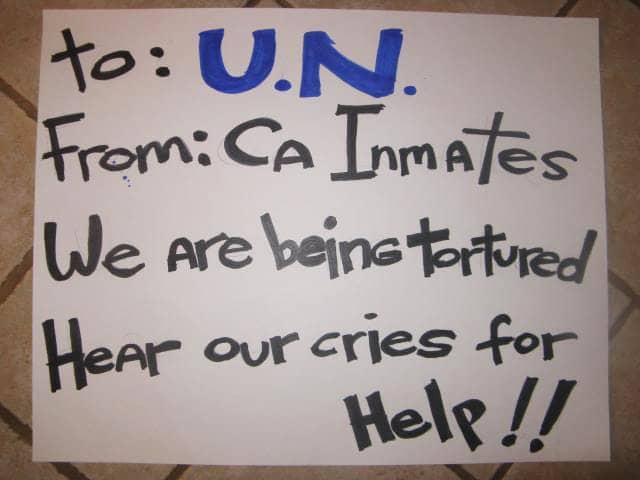
16. “I have been in the SHU control unit for 15-plus years and I have experienced the entire SHU psychological spectrum – mood swings, loss of interest, restlessness in the mundane repetition of doing the same thing over and over. I have witnessed the horrors of self-mutilation of prisoners, the prison guards assaulting prisoners, myself included. You become desperate, feel helpless and hopeless in the face of the inhumane treatment we face day after day, 365 days a year.” – Michael E. Spencer, E-90535, Pelican Bay State Prison SHU
17. “I have been in segregation for more than three years. It is completely stressful, depressing and torture.” – GR, California Correctional Institution SHU
18. “For 17 years I’ve been isolated to indefinite SHU confinement where living conditions of mental and physical suffering falls on deaf ears. My right to self-preservation is diminished by daily demeaning humiliation and torture in a country that prides itself on defending democracy, equality and humanity, in which my existence is nil.” – Donald Lee Moran Jr., J-20212, Pelican Bay State Prison SHU
19. “It takes my breath to think I am spending my days in total isolation, without human contact. It’s slowly breaking my will, soul and spirit. It’s only been 17 months. This is called torture.” – Carlos Roberto Robledo, T-72730, Calipatria State Prison ASU. He spent the last almost two years in “temporary” segregation at Calipatria State Prison ASU until his recent transfer to Corcoran State Prison SHU.
20. “After eight years, you realize after doing everything they ask you to do, staying out of trouble and minding your own business was not enough. They (CDCR) want to take away your humanity. There is nothing more dreadful in the world then waking up in the middle of the night and feeling like you’re in a mortuary. Even sleep cannot spare me from this hellhole I’m in. Hope has been gone for many years.” – Derek Carbajal, H-86305, Pelican Bay State Prison SHU
21. “I have been in segregation for two years and there is no worse feeling than this in the world. It’s tortured my mind, soul, body as well as given me insomnia, mood swings and depression.”
22. “During my time in the SHU, I’ve been subjected to six to eight cell searches a year for false reasons. During these searches I’ve had the only things I consider dear to my heart disrespected, including my family photos. I try to address these issues, which I am ignored by prison staff and laughed at. Is that humane?” – Richard Satterfield, T-79743, California Correctional Institution SHU
Contact Bay View editor Mary Ratcliff at editor@sfbayview.com or (415) 671-0789.





